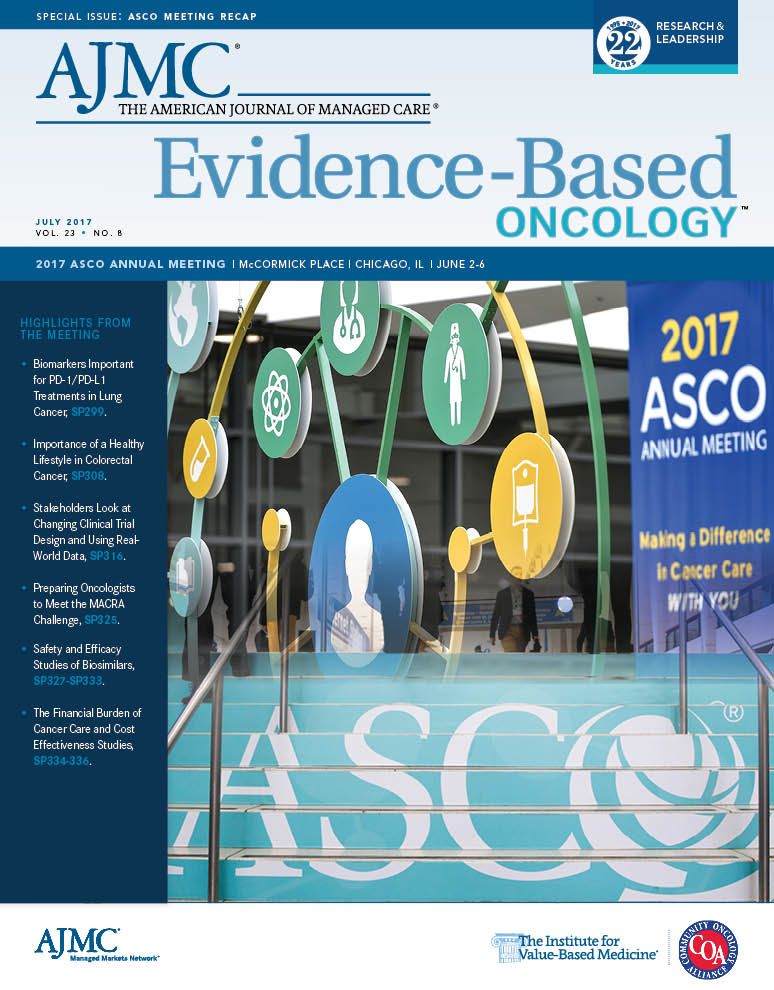- Center on Health Equity & Access
- Clinical
- Health Care Cost
- Health Care Delivery
- Insurance
- Policy
- Technology
- Value-Based Care
Ibrutinib vs No Consolidation Are Being Compared Following Autologous HSCT in IRONCLAD Trial
A poster session at the 2017 American Society of Clinical Oncology Annual Meeting presented the trial details of IRONCLAD, a randomized phase 3 study of ibrutinib versus no consolidation following autologous hematopoietic stem cell transplantation for activated-B-cell subtype relapsed diffuse large B-cell lymphoma.
RELAPSED DIFFUSE LARGE B-CELL LYMPHOMA
(DLBCL) in the rituximab era portends a poor prognosis: only approximately 25% of patients achieve long-term disease control following second-line therapy and autologous hematopoietic stem cell transplantation (auto HSCT). Further, patients with the relapsed/refractory activated—B-cell (ABC) subtype have a poorer prognosis at diagnosis than those with germinal center disease and are overrepresented at relapse.
A poster session at the 2017 American Society of Clinical Oncology Annual Meeting presented the trial details of IRONCLAD, a randomized phase 3 study of ibrutinib versus no consolidation following auto HSCT for ABC subtype DLBCL.1 The trial began in 2016 and final data collection for evaluation of the primary outcome measure, superior 24-month progression-free survival (PFS), will be in 2020.2
IRONCLAD is targeting disease pathobiology at the time of auto HCT in an effort to improve outcomes in ABC-DLBCL. Ibrutinib possesses a safety profile that allows it to be combined with cytotoxic chemotherapy and confers single-agent activity with a 37% response rate in patients with relapsed/ refractory ABC-DLBCL. The intergroup, randomized, placebo-controlled, phase 3 study combines ibrutinib or placebo with high-dose chemotherapy during conditioning with auto HCT and for the following 12 months. Patients with relapsed/refractory DLBCL undergo tissue resection and these samples are submitted centrally for real-time review and subtype assignment.
Eligibility criteria include no more than 3 prior regimens, no active central nervous system involvement, no need for long-term anticoagulation, and no progression with prior ibrutinib therapy. Patients with chemosensitive ABC-DLBCL are randomized to ibrutinib 560 mg or placebo with carmustine, etoposide, cytarabine, and melphalan (BEAM) or cyclophosphamide, BCNU (carmustine), and VP-16 (CBV) chemotherapy until day 0. After engraftment, patients receive ibrutinib 560 mg daily or placebo for 12 additional cycles. Patients with progressive disease on placebo will be eligible to cross over to ibrutinib monotherapy. An initial safety cohort of 6 patients is being enrolled to evaluate the tolerability of ibrutinib with concurrent BEAM and CBV therapy.
As previously stated, the primary endpoint is superior 2-year PFS (Ha/ H0 67% versus 50%). Secondary endpoints include time to count recovery, posttransplant response rates, overall survival (OS), PFS, and the incidence of secondary malignancies. PFS is defined as the proportion of patients who are alive and progression-free 2 years from randomization, using the Lugano classification.2 Secondary outcome measures include:2
- The incidence of hematologic toxicity of ibrutinib therapy in up to 60 months, summarized using contingency tables
- The incidence of secondary malignancies in up to 60 months
- The incidence of secondary malignancies, summarized using contingency tables
- OS from randomization to death from any cause, assessed up to 60 months
- For each arm, the distribution of OS will be estimated using the Kaplan-Meier method and will be compared between the 2 arms using the log-rank test and Cox regression method, adjusting for known predictors
- PFS, from registration to disease progression or death, whichever comes first, in up to 60 months
- For each arm, the distribution of PFS will be estimated using the Kaplan- Meier method. PFS will be compared between the 2 arms using the log-rank test and Cox regression method, adjusting for known predictors.
- Response rate using the Lugano classification in up to 60 months. The metabolic response proportion following auto HCT will be compared between the 2 arms using the Chi-squared test
- Time to hematopoietic engraftment (platelet count ≥20,000/mcL following nadir) from the first day of 1 week without platelet transfusion, assessed up to 60 months
- Treatment-related mortality for up to 60 months, summarized using contingency tables
The prognostic and predictive role of a pretransplant fludeoxyglucose PET scan in the setting of ibrutinib or placebo therapy, the role of emergent B-cell antigen receptor pathway mutations, double-hit genetics, and pharmacogenetic determinants of treatment outcome and toxicities will be assessed in correlative studies. A total of 296 patients are expected to accrue over 4 years.
IRONCLAD is being undertaken by the Blood and Marrow Transplant Clinical Trials Network (BMT CTN), which was established to help meet a critical need for multi-institutional clinical trials that focus directly on improving survival for patients undergoing hematopoietic cell transplantation. Since 2001, the BMT CTN has opened more than 30 multi-institutional phase 2 and 3 trials, involved more than 100 transplant centers, and enrolled thousands of patients.3
BMT CTN is funded through the National Institutes of Health.REFERENCES
1. Andreadis C, Fenske TS, Hill BT, et al. Ironclad: a randomized phase III study of ibrutinib (Ibr) or no consolidation following autologous hematopoietic stem cell transplantation (AutoHCT) for relapsed/refractory activated-B-cell (ABC) subtype diffuse large B-cell lymphoma (DLBCL). J Clin Oncol. 2017;35(suppl; abst TPS7566).
2. Ibrutinib before and after stem cell transplant in treating patients with relapsed or refractory diffuse large B-cell lymphoma. ClinicalTrials.gov website. clinicaltrials.gov/ct2/show/NCT02443077. Updated June 27, 2017. Accessed June 30, 2017.
3. Blood and Marrow Transplant Clinical Trials Network. cibmtr.org/Studies/ClinicalTrials/BMT_CTN/pages/index. aspx. Updated June 14, 2017. Accessed June 30, 2017.

Telehealth Intervention by Pharmacists Collaboratively Enhances Hypertension Management and Outcomes
January 7th 2026Patient interaction and enhanced support with clinical pharmacists significantly improved pass rates for a measure of controlling blood pressure compared with usual care.
Read More

